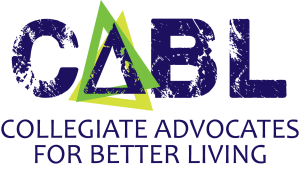Collegiate Advocates for Better Living (CABL) is a student-lead ministry on the campuses of Adventist colleges and universities. The purpose of CABL is to engage college students in sharing Adventist health principles with their peers, leading to better health and school performance.
The student advocate also benefits by gaining leadership skills, practice in health education, and a greater sense of purpose. Students are enabled to make a constructive difference with peers and the surrounding campus communities.
CABL’s goals are to involve students, faculty, staff, and the community of NAD colleges/universities in healthy choices and activities thereby effecting positive lifestyle changes.
Goals & Objectives
- To promote understanding of and participation in Adventist lifestyle beliefs and practices on school campuses
- To provide students with practical training in leadership and health education
- To engage all members of a school campus in making healthy choices
- To improve the physical, emotional, social, and spiritual health of students through learning and engagement.
History of CABL
- CABL was instituted in the early 70’s by students at South Western Adventist University to promote healthy lifestyles on campuses and used as an in reach and outreach tool.
- Student leaders are either selected or elected (if elected it is often through the student association)
The student leader may be under the chaplain or faculty members from a variety of campus departments, i.e., Wellness, Nursing, Physical Education, Outward Pursuits, etc. - Stipends from the NAD are paid to the students and not to the overseeing department. This served as a payment for a portion of the work to lead, promote and organize health programs on the campuses.
- Monitoring & Accountability is carried out by a reporting system to the NAD Health Department, which includes completing and returning forms by particular deadlines, verifying required programming.
- CABL Student Advocates should attend the yearly (CABL, Campus Ministries and Student Missions) conference and report what programming occurred on the campus and to bring new ideas. If possible, the CABL leader for the next year should attend the conference, if only one student could attend.
- Input and training will be provided from the NAD Health Ministries Department personnel for aspects related to health. Student Advocates should try to attend the Health Summit if it occurs during their term of service.
- CABL has a focus health living and on temperance, therefore addictions awareness is listed as one of requirements.
Contact Us for more information.

